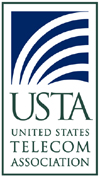 |
NEWS RELEASE 1401 H STREET NW SUITE 600 | WASHINGTON DC 20005-2164 | TEL 202.326.7360 | FAX 202.326.7339 |
FOR IMMEDIATE RELEASE
October 31, 2000
CONTACT: David A. Bolger
(202) 326-7363
USTA DISAPPOINTED IN VETO OF REPEAL OF TAX ON TALKING
WASHINGTON - Last night, President Clinton vetoed a bill that included a measure to eliminate the three percent federal excise tax on telecommunications, known as the Tax on Talking. Consumers are taxed on their local, long distance, and wireless phone bills, including dial-up access to the Internet, costing an estimated $5 billion annually.
"The elimination of the federal excise tax would have been a victory for consumers, who have paid for this 'temporary' tax for more than a century," said Gary Lytle, interim president and CEO of the United States Telecom Association (USTA). "Unfortunately, the President rejected what would have been a significant monthly tax break for nearly every American. USTA has been a strong advocate on behalf of consumers, fighting for the repeal of this unfair tax. We applaud Congress for passing legislation to repeal the tax, but we are disappointed that the President passed up an opportunity to lower telecommunications taxes, which in addition to being regressive, are harmful to the growth of technology." Lytle added.
The Tax on Talking was first introduced in 1898 by the federal government to support the nation's effort in the Spanish-American War, before income taxes were levied. At the time there were two million phones in the United States, and the tax was a luxury tax on the wealthy. Over the past 100 years, the tax has generally been increased at times of national mobilization for war (WW I, WW II, Vietnam), or has been reduced or even eliminated during other times. Today, there are 252 million phones in the United States, including wireline and wireless devices, and 38.8 million people accessing the Internet through a dial-up connection.
# # #
For more than 100 years, USTA has been representing the interests of the nation's telecom industry. The association represents more than 1,200 companies worldwide that provide local exchange, long distance, wireless, Internet, and cable services.